
An interview with Jonathan Scott

If you were a ZX Spectrum or Amstrad CPC text adventure player in the 1990s then it’s likely that you would have been familiar with the names of teenagers Jonathan Scott and Stephen Boyd, thanks to their many releases through John Wilson’s Zenobi Software and Joan Pancott’s WoW Software.
In April 2022, Jonathan Scott was kind enough to answer some of my questions and share his memories of those adventure writing days in Northern Ireland...
How did you get into computers and the ZX Spectrum in particular?
"My dad decided to buy a ZX Spectrum 48K in 1985. I was ten years old at the time and remember playing the free games, such as Horace Goes Skiing and [going on to play] my favourite game of all time, Head Over Heels, which I eventually completed."
When did you first come across adventure games and how did you get into writing them?
"The first adventure games that I encountered were Colossal Cave-type adventures on the Acorn computers at my secondary school around 1987 - and then eventually I played other games on the ZX Spectrum [including] games bought from Zenobi Software. My dad also kindly subscribed to Adventure Probe and later another Spectrum based fanzine. But I had been a reader of Your Sinclair and discovered Zenobi Software in there.
For some reason, I convinced my dad to buy The Quill [from Gilsoft] and I spent part of one summer around 1989 (when I was 13 years old) designing and writing Escape From Hodgkin's Manor which was eventually released by Zenobi Software in 1990."
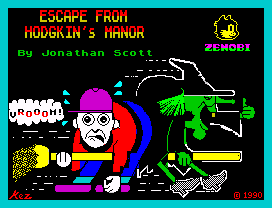 Escape from Hodgkin’s Manor, was produced with Gilsoft’s Quill and also The Patch support program. What was the experience of writing the game like? Had you tried any other utilities or methods of creating a game before then?
Escape from Hodgkin’s Manor, was produced with Gilsoft’s Quill and also The Patch support program. What was the experience of writing the game like? Had you tried any other utilities or methods of creating a game before then?
"I had not tried writing an adventure game before, as far as I can recall, as The Quill was the only utility that I can remember working on at that point. I had previously mastered BASIC language quite well, but had given up on machine code. I had planned to write platform games but that didn’t materialise, so text adventures were an obvious alternative.
The Quill was straightforward and intuitive but quite limited compared to later packages, but for me as a young teenager it was ideal to write a fairly basic text adventure game. I only vaguely remember The Patch but it must have been particularly useful."
Escape from Hodgkin’s Manor introduced players to the protagonist Fred Brief and also to Basil Hodgkins; the local nutty scientist and town weirdo. You had a whole roster of supporting characters in this and the subsequent games in the series. The world-building and character creation side of things seems to have been quite important to you?
"Fred was a sort of alter ego and semi-autobiographical character. An ideal me in a way. Fred (who was a kid in the first game and throughout the whole series) had a bicycle, which I was never allowed as my mother feared I might be hit by a car. And he also had a paper round which I didn’t have. Susan Brief was his mother and Del Fell his father - who were completely different from my own parents. Professor Sir Basil and Lady Matilda Hodgkins, as were most of the other zany characters, were imaginations that only a teenage mind could perhaps conjure up.
I guess many characters were influenced by TV programs, e.g. Del (Derek) borrowed the name of Derek Trotter from “Only Fools and Horses” but Del Fell was a former coal miner. Who knows what I picked up from the TV in my childhood! The supporting characters in the first game were entirely of my own development but the later characters were created collaboratively with my co-author Stephen Boyd."
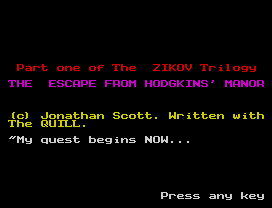 |
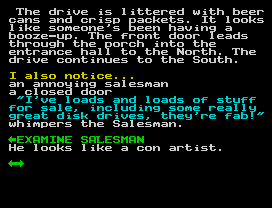 |
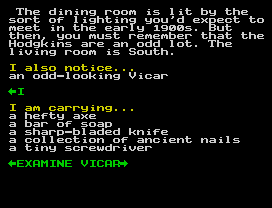 |
Hodgkin’s, like most of your subsequent games, was published by Zenobi Software. How did you get involved with John Wilson?
"I had played numerous games purchased from Zenobi Software. Therefore, I sent my first game to John Wilson and he sent it to playtesters who loved it - and it got published."
Hodgkin’s was the first adventure in what was initially planned to be a trilogy of games in the Zikov series. Was it always your plan to write a continuing series?
"I can’t recall if Hodgkin’s Manor was intended to be the first part of a trilogy. It seemed to go down well with players, but I think I had already started writing Red Alert in the summer of 1990 and it didn’t work on Quill so I got hold of PAW which had some great features and yet still had to split it into two parts."
How else did switching to the Gilsoft's The Professional Adventure Writer change things for you?
"The Quill was great for my first game but I couldn’t have characters wandering around etc, and have various other sophisticated features, so I tried my hand at PAW.
Then I was a bit stuck on what to do next, so needed to involve a co-author. Programming was always my strong point but creating an adventure was a challenge."
You began to work and collaborate with Stephen Boyd on games. I seem to remember that he was based locally to you. Where did you know Stephen from?
"Stephen and I first met when we were 11 years old. We were in the same class at secondary school. We were part of a group of about four friends but Stephen and I were [the ones] interested in computer games.
We designed the maps for most of our games in our classrooms when we were supposed to be studying! (Nonetheless, we eventually both got PhDs) Then I programmed the games on the ZX Spectrum and we collaborated on writing the text. Thus our co-authored games are very different in many ways from my early games."
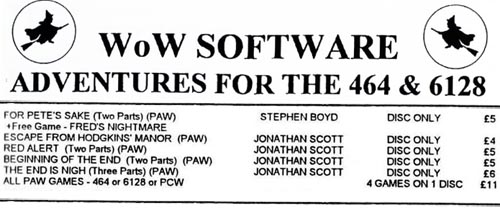 The credits for all your various projects have become a little unclear and mangled on the various archive sites.
The credits for all your various projects have become a little unclear and mangled on the various archive sites.
If I recall correctly, Stephen was an Amstrad CPC owner. You’d port each other’s games between the two platforms and collaborate on some of the titles; with John Wilson at Zenobi releasing the Spectrum version and one of the Amstrad indie publishers, such as Joan Pancott distributing the game through her WoW Software...
"I programmed most of the early games on PAW and then Stephen converted them to the Amstrad platform.
At some point, then I also converted [other people's] games to the ZX Spectrum - possibly some of Peter Clark's games, but at least one of Frank Fridd's. But here my memory has completely gone!"
Yes, I think we've got you credited for the Spectrum port of Frank's Where is Zeus? game.
"Stephen’s first solo game was Knight Life that WoW Software published , then I converted it to PAW on the Spectrum and Zenobi released it."
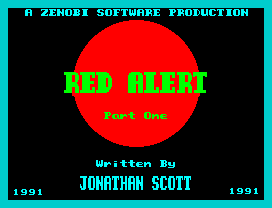 |
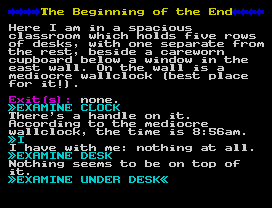 |
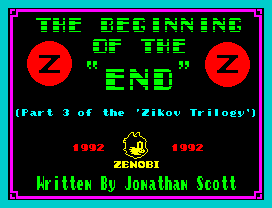 |
As well as going on to produce the second and third Zikov titles, Red Alert and The Beginning of the End, the adventure For Pete’s Sake started off a new series of games starring Julia and Pete Brief. Did you find that your existing cast of characters helped you and Stephen come up with ideas for new games?
"So, as we diverged from the Zikov games which were pretty much done and dusted (in terms of the design of the maps - on paper - for the games and all the characters, objects etc) by 1991, Stephen suggested we write some games starring Julia Brief as the main character. And Pete was her ex husband, but they get back together in the first game, and eventually they had a baby.
I recall that I had split up from my girlfriend at school and was quite heartbroken, so the design of the game was quite influenced by that - so I guess Pete being reconciled with Julia was how I wanted to be with my then ex girlfriend - a fantasy world projection of an ideal world. But it didn’t happen. When we designed the first game I can only have been about 15 at the most.
I also liked the idea of a woman as the main character since I have always been supportive of women’s rights - indeed, much of my own academic research has subsequently been about gender equality and women entrepreneurs. But it was quite unusual for such a game to be written by two teenage boys … indeed, 16-year-olds when the game was released."
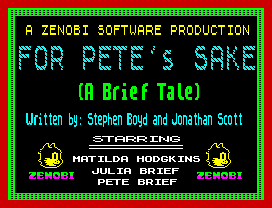 |
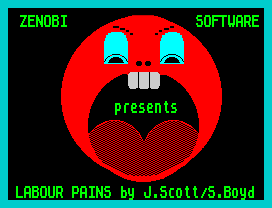 |
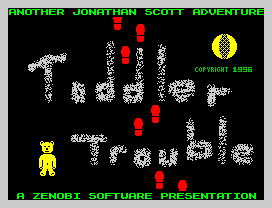 |
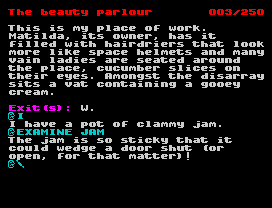 |
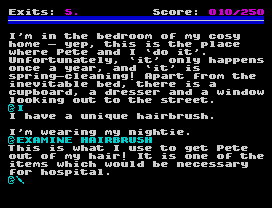 |
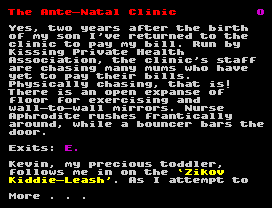 |
"I’m not quite sure how we progressed them through the second game, Labour Pains, where Julia was pregnant (actually in labour) and then having a toddler to look after in the third game, Toddler Trouble. But we designed all these games before we left secondary school at 16 (in 1992), with the first game being released in 1993, and then it took quite a few years for the others to materialise as I got distracted by my other more serious games and Stephen was at a grammar school doing A-levels before university.
Meanwhile, I joined a local “gang” of teenage boys in the years 1992 - 1993 before returning to a grammar school to do a GNVQ and an A-level; we didn’t do any crime but we just looked like young hoodlums. Stephen was too sensible to be in this “gang”. The gang members were all good boys and are all good family men now decades later.
In terms of the cast of characters, it was quite easy for Julia to be Fred’s aunt. And Matilda and other characters reappeared in all these games. Fred will have appeared in a cameo role in various games too. The characters helped us design the games and come up with new stories to base the games around."
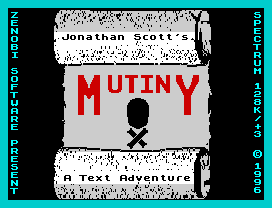 Although your games are generally known for their quirky humour, you produced several adventures of a more serious nature. Lycanthropy and Mutiny were both incredibly detailed and well-researched; which, to be fair, could equally be said about yours and Stephen’s humorous titles too. In a pre-Internet age that attention to detail must’ve been quite time consuming?
Although your games are generally known for their quirky humour, you produced several adventures of a more serious nature. Lycanthropy and Mutiny were both incredibly detailed and well-researched; which, to be fair, could equally be said about yours and Stephen’s humorous titles too. In a pre-Internet age that attention to detail must’ve been quite time consuming?
"Some of those humorous games are reflective of the joky nature of us as teenage boys, but my parents and I watched period dramas (based on Dickens) and also “Treasure Island” type series were a favourite. So that would have inspired Out of the Limelight and Mutiny.
I think I must have used the local library, and also our encyclopaedia, to research these games. That means they were more accurate than many of the unreliable internet sources.
I finally went to University in 1995 and had access to the internet there, and my dad had internet installed at home eventually. But probably not when I was writing these earlier games. It is no surprise that I eventually enrolled for a PhD in 1998 as I always enjoyed research.
However, Zenobi Software seems to have published my last games in 1997 which is when they sadly stopped … and then I did write a few more solo games (e.g. Murder Mystery Weeked) as Stephen had also gone to university to study Biomedical (or Biological) Sciences and didn’t have time. Whereas I did a Geography degree, and still had time to write games.
We were both the first generation at university in our families. Our original vision was we were going to make our fortunes writing adventure games but the royalties weren’t quite what we expected."
Was it more difficult to write the ‘serious’ games?
"The research for these games was a passion of mine but so was stretching PAW to have characters wandering around, interacting etc, and many other sophisticated tricks. I don’t recall that it was any more difficult but what was difficult was coming up with jokes. In that regard, a bit of research to ensure accuracy was easier than making players laugh."
Out of the Limelight and Loose Ends combined a historical setting with your trademark humour, in two very interesting tales about the thespian Sir Ignatius Grimwood. The theatrical setting works really well. Were you pleased with how those turned out?
"Yes, I was very happy with these games as they were ideas I had early on but I was slightly more mature when I wrote the second game which is somewhat more advanced than the first one.
Having had another look at them, it amazes me, however, that I wrote Out of the Limelight when I was only 16 years old - since it was released in 1992 (and I turned 17 in November 1992). Similarly, Lycanthropy was released in 1993. But there are telltale signs no doubt that these games were written by a teenage boy, whether it’s the humour or some of the silly character names!"
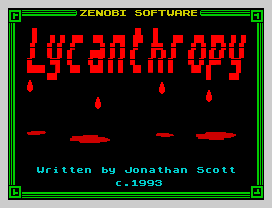 |
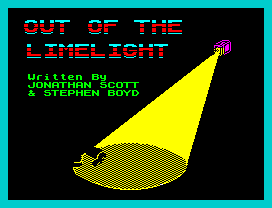 |
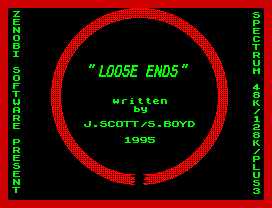 |
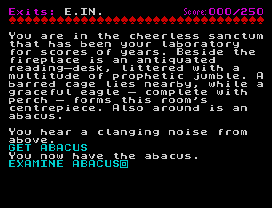 |
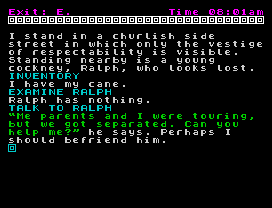 |
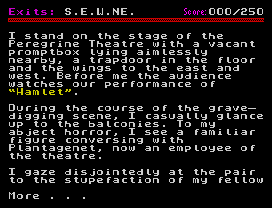 |
Your other games included further Zikov-universe adventures such as The End is Nigh and Why is the World Round Anyway? As well as other, unconnected titles like All in a Day’s Work and your aforementioned port of Stephen’s Knight Life. You were producing a lot of games each year! Was it an enjoyable process?
"I loved writing text adventure games. And I enjoyed the challenge of programming them and writing the text. The breakup with my girlfriend at school really hurt, and designing, writing and programming these games was pure escapism. As I guess was the “gang” that I joined but I still managed to find time to write games. Whilst I was in the “gang” and before I returned to school, I was a trainee computer programmer at a local Youth Training Programme (YTP) but learning some other type of coding. I initially saw it as a gateway into being a professional game writer … rather than part-time … but, in the end, I went back to school!
Perhaps not surprisingly, I didn’t have another girlfriend until 2002 due to my broken heart, writing adventure games, and then doing a PhD."
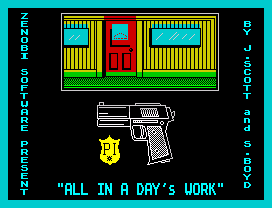 |
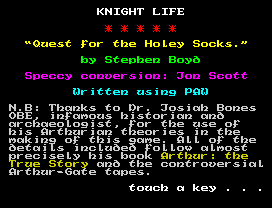 |
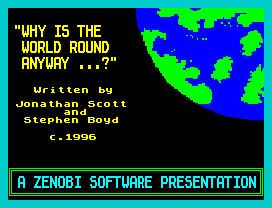 |
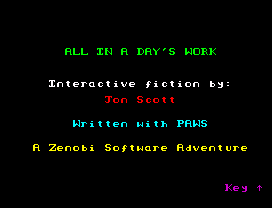 |
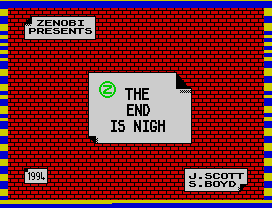 |
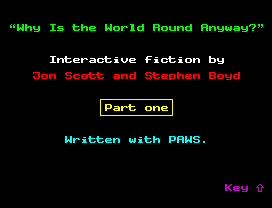 |
It’s impossible to have a conversation about writing and playing text adventures in the UK at this time without mentioning Adventure Probe. You were a regular contributor to the fanzine, writing articles and reviews, submitting tips, and penning humorous pieces. How did you come across Probe?
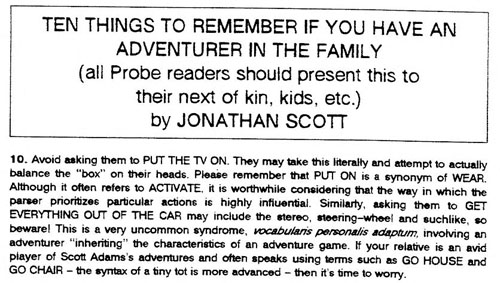 "My dad subscribed to Probe and then I started writing articles and reviews etc eventually - some of which were spinoffs from our games. It was a really wonderful community and that led to attending my first Adventure Convention in Birmingham around 1994 and making some lifelong friends."
"My dad subscribed to Probe and then I started writing articles and reviews etc eventually - some of which were spinoffs from our games. It was a really wonderful community and that led to attending my first Adventure Convention in Birmingham around 1994 and making some lifelong friends."
I don’t think people these days quite appreciate what the community around the fanzine was like. The letters pages, in particular, had all the good and bad features of an Internet forum, before many people had even ventured online.
"It was incredible. And was better than online. And no trolling!"
Oh, I think there was a little bit of trolling in the letters section and the Cockroach column!
With the demise of Your Sinclair and the other mainstram Spectrum-focused magazines, Adventure Probe, as well as other indie publications like Red Herring and The Adventure & Strategy Club magazine, were one of the only ways to reach adventure players at the time. A review in Probe was an essential way of publicising a game but that whole process could be frustrating sometimes, especially as not every reviewer appreciated our sort of youthful takes on adventure gaming (and humour)!
"Yes, exactly… the reviews were very much appreciated.
Not everyone appreciated our humour! The earlier games in particular had teenage boy humour - nothing particularly rude - but perhaps appealed to a particular audience.
I guess the serious games were intended for a wider audience but still many players (including some wonderful older ladies) really enjoyed Fred Brief and his antics."
One of the offshoots from Probe was the annual UK adventure conventions that were held for many years in Birmingham. When did you first attend and what can you remember about those events?
"I attended many of these from about 1994 onwards. I went over on the bus. Stephen also went one year but by then the Convention had moved to Coventry until it stopped.
Later we met up at “Hamilton Halls” at London’s Liverpool Station but it has been many years since the last meet-up.
These were a real social gathering of adventurers and it was a delight to spend time with the people who had played and enjoyed my games. And I must apologise to all of them for subjecting them to my humour in person, and also my many wind-ups. They were from all ages and backgrounds. I first attended when I was a teenager and I was one of the youngest there."
The convention (and associated other gatherings) inspired quite a few games. Murder Mystery Weekend was your take on the proceedings. It included lots of familiar faces from the UK adventure scene and set the player the task of solving the titular murder mystery. These sorts of games do tend to have a lot of in-jokes but they do provide a great snapshot of that time in UK text adventuring.
"My humour metamorphosed (a subtle reference to Lycanthropy here) into turning the real world of the convention into a game. That particular convention overlapped with a Murder Mystery Weekend which we didn’t participate in but inspired the game."
 |
Although MMW was the last of your games to be published by Zenobi, it wasn’t your last Spectrum game. Wartorn Land exists in the archives. I’m guessing that it was originally planned as a Zenobi release but never made it out in time?
"I designed it and had programmed it but Zenobi stopped publishing games by then."
As well as porting Stephen’s Amstrad games, as we mentioned earlier there were also collaborations with other adventure writers such as Peter Clark. You produced the Spectrum adaptations of his Midsummer Day’s Dream and Hounds of Hell games, for instance?
"Yes, I converted his games [from the Amstrad] to PAW and these were released by Zenobi presumably? I can’t recall 100%."
It would’ve been The Adventure Workshop for the Spectrum versions. WoW Software had released the Amstrad originals, which were produced with the CP/M version of the PAW.
"Peter was a real gentleman and I remember he was at most of the conventions - quite a character and a pleasure to spend time with. He wrote some very humorous articles in Adventure Probe too and some excellent games."
Like many Spectrum owners, you eventually upgraded to a 16-bit machine although you kept on playing (and writing) games for Spectrum. You reviewed games for both the PC and Amiga in Probe, so I’m guessing you had access to both?
"Yes, my dad bought a PC and an Amiga but I never wrote games on these."
One of Steve Clay’s Amiga columns in Adventure Probe also mentions that you were, at one point, converting For Pete’s Sake to the Amiga, using Hatrack II. Ironically, that very same issue lists you selling your copy of Hatrack II in the “small ads” section, with the intention of upgrading to TADS! I’m guessing your experiences with Hatrack weren’t that positive?
"I don’t think For Pete’s Sake ever made it to the Amiga. I got rid of Hatrack II and had a go at TADS but never got to grips with either."
A later issue mentions that you were also looking to use AMOS and Steve Clay’s ADVSHELL to make something for the Amiga?
"Yes, and again these never materialized. Zenobi was an anchor that was no longer there.
I have forgotten most of these points!"
 (Copies of the fictitious newsletter The Daily Expatiator, edited by Susan Brief, were often included with games set in the Zikov universe.) |
Although all your Spectrum adventures seem to be archived, there are some lost games. Most of the Amstrad versions of yours and Stephen’s games aren’t available, for example.
"I don’t know what happened to the Amstrad versions of these games. Spectrum gamers seem to have been more diligent at converting and uploading them."
Other later adventures exist only as references in the archives online; such as 25 and The New Venue (another collaboration with Frank Fridd).
Both of those titles were designed as games for the annual convention’s MegaPoints competition; a fun event where attendees would be given a set time to try and score as many points in an adventure as possible. What can you tell us about those two particular adventures?
"25 was for the Megapoints in 1998. It’s quite a sad story because I started writing the game then my grandad suddenly died in mid October, and I had to finish the game the night before the convention started!
I nearly gave the organisers collective heart attacks as they almost nearly didn’t have a Megapoints. 25 involved 25 of something but maybe 25 points…
And it was a hilarious mishap as there were bugs and howlers in the game and many players were laughing throughout, not just at the humour.
The NEW VENUE was Frank’s game, on the Amstrad presumably (?), that I converted to the Spectrum. And possibly at least one other game of his. The new venue was based on the new venue for the convention but that’s all I can recall."
Over on CASA we have a solution for a two part Spectrum game called Who is Gordon Bennet? Although it similarly involves time travel and your characters, it doesn’t seem to match The End is Nigh or The Beginning of the End. Is it one of yours? Annoyingly there’s no file archived online, so it must’ve been passed around the community.
"Yes, Gordon Bennet is ours. It was a follow-up to “Why Is the World Round Anyway” where Fred returned due to popular demand!
[The solution] says “return to your school”. I can’t recall but it’s possible we designed the maps and school and eventually wrote the games, or maybe we designed the maps after the Brief Trilogy (Julia and Pete). Definitely one of our Fred Brief games but it sadly just missed release by Zenobi."
Are there any other lost games, or games that we’ve missed?
"Not that I can think of. The archives have been very thorough and I’d actually forgotten about Gordon Bennet and (due to the trauma of writing it and watching it being played) 25."
You’ve produced over twenty adventure games… well over thirty if you count each instalment of the multi-part games as separate adventures and all the ports. That’s pretty impressive by anyone’s standards! Do you have any particular favourites?
"Whilst I thoroughly enjoyed the historical games (Lycanthropy being a favourite), all the games starring Fred are my favourites as he was an alter ego of me … and so with those games I could really imagine being the main character. I don’t know if the players felt the same.
My favourite, of course, is Escape From Hodgkins’ Manor."
Where did life take you after your text adventuring days?
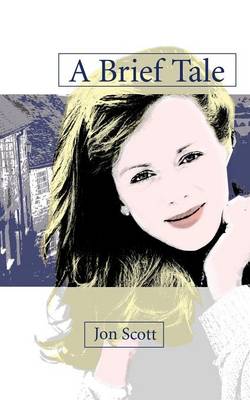 "In brief (pardon the pun), I completed my PhD and got my first academic job at the University of Durham in 2001. I had another breakup with my then girlfriend in 2002 (a repeat of what had happened at school over 10 years earlier) and wrote a novel featuring many of the characters from our games, called A Brief Tale. The star was Susan Brief and her son Fred.
"In brief (pardon the pun), I completed my PhD and got my first academic job at the University of Durham in 2001. I had another breakup with my then girlfriend in 2002 (a repeat of what had happened at school over 10 years earlier) and wrote a novel featuring many of the characters from our games, called A Brief Tale. The star was Susan Brief and her son Fred.
I was in a fragile emotional state at the time as the cover blurb indicates:
“Susan Brief is blond, attractive and just thirty-four. Her relatively short life is full of tangled relations: Her son, Fred, at thirteen is on the edge of, er, everything; her ex, the boozy diehard Derek, is on the loose and after her.“
Instead of writing a novel featuring our hero Fred, his mum Susan (who didn’t really appear much in the games) was the star - and Del Fell (who is trying to get back together with her), and of course Julia and Pete and many other characters such as Aggie and Albert Richards appear.
I have never actually managed to settle down and get married and start a family yet. Not that I have given up on that either!
I moved to Wolverhampton in 2004, Belfast in 2008, Darlington again (in 2009 and yet another breakup in 2012!!!), then eventually to Hamilton, New Zealand in 2020 after 1 or 2 trips here per year. Because I have family here… and their kids are all addicted to the PS4 or Roblox (whereas from 1989 - 1997 I was pretty addicted to my ZX Spectrum and writing games).And I have worked in various academic jobs and, instead of publishing text adventure games, I have co-authored over 30 academic journal articles, various reports, books and book chapters since 2005; see here. So writing is my forte. But these have all been work."
Have you ever thought of returning and writing a new adventure or piece of interactive fiction?
"It’s been well over 20 years since I last wrote an adventure game. I don’t know if I would know how to any more! The teenage boy version of me that co-authored most of those games was a very different creature … and thus the games with Fred, or Julia, or even the more serious games, would be difficult to emulate.
Writing adventure games (and the spin-off 2002 novel, eventually published in 2004) was fun and pure escapism. My obvious next Interactive Fiction game would star Fred Brief but a grown-up time-travelling Fred Brief in 2022 going back to the 1990s and disguising himself as various characters in the original games in order to help the schoolboy Fred Brief to navigate the various games! :)"
I really like the sound of that!
My thanks go to Jonathan Scott for taking the time to answer my questions. You can play most of his Spectrum adventures through the archive at Spectrum Computing.
|